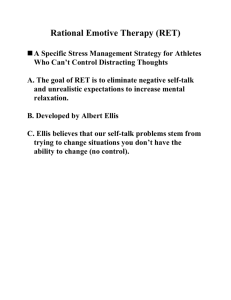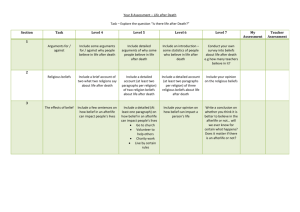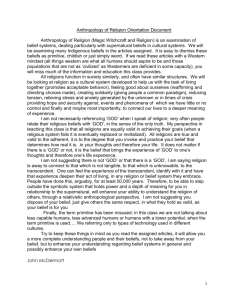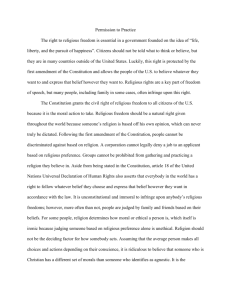Why We Believe - David Center Dot Com
advertisement
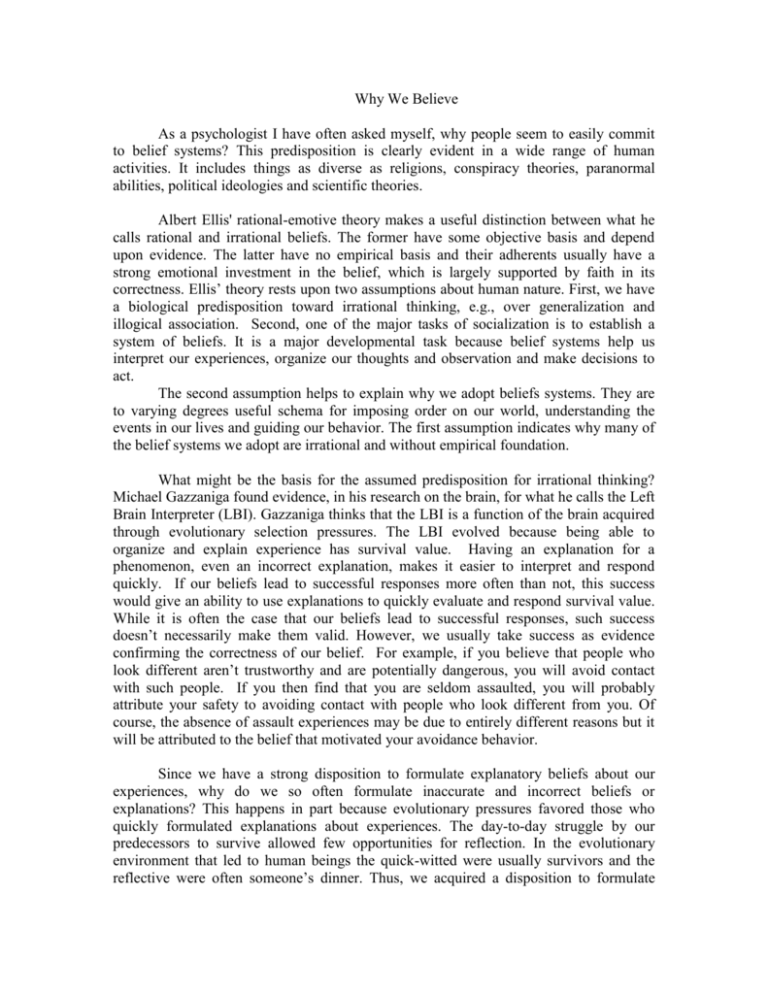
Why We Believe As a psychologist I have often asked myself, why people seem to easily commit to belief systems? This predisposition is clearly evident in a wide range of human activities. It includes things as diverse as religions, conspiracy theories, paranormal abilities, political ideologies and scientific theories. Albert Ellis' rational-emotive theory makes a useful distinction between what he calls rational and irrational beliefs. The former have some objective basis and depend upon evidence. The latter have no empirical basis and their adherents usually have a strong emotional investment in the belief, which is largely supported by faith in its correctness. Ellis’ theory rests upon two assumptions about human nature. First, we have a biological predisposition toward irrational thinking, e.g., over generalization and illogical association. Second, one of the major tasks of socialization is to establish a system of beliefs. It is a major developmental task because belief systems help us interpret our experiences, organize our thoughts and observation and make decisions to act. The second assumption helps to explain why we adopt beliefs systems. They are to varying degrees useful schema for imposing order on our world, understanding the events in our lives and guiding our behavior. The first assumption indicates why many of the belief systems we adopt are irrational and without empirical foundation. What might be the basis for the assumed predisposition for irrational thinking? Michael Gazzaniga found evidence, in his research on the brain, for what he calls the Left Brain Interpreter (LBI). Gazzaniga thinks that the LBI is a function of the brain acquired through evolutionary selection pressures. The LBI evolved because being able to organize and explain experience has survival value. Having an explanation for a phenomenon, even an incorrect explanation, makes it easier to interpret and respond quickly. If our beliefs lead to successful responses more often than not, this success would give an ability to use explanations to quickly evaluate and respond survival value. While it is often the case that our beliefs lead to successful responses, such success doesn’t necessarily make them valid. However, we usually take success as evidence confirming the correctness of our belief. For example, if you believe that people who look different aren’t trustworthy and are potentially dangerous, you will avoid contact with such people. If you then find that you are seldom assaulted, you will probably attribute your safety to avoiding contact with people who look different from you. Of course, the absence of assault experiences may be due to entirely different reasons but it will be attributed to the belief that motivated your avoidance behavior. Since we have a strong disposition to formulate explanatory beliefs about our experiences, why do we so often formulate inaccurate and incorrect beliefs or explanations? This happens in part because evolutionary pressures favored those who quickly formulated explanations about experiences. The day-to-day struggle by our predecessors to survive allowed few opportunities for reflection. In the evolutionary environment that led to human beings the quick-witted were usually survivors and the reflective were often someone’s dinner. Thus, we acquired a disposition to formulate beliefs or explanations on the basis of little or no information and what information we had was frequently incorrect. Frank Barron, a creativity researcher, pointed out many years ago that his research suggested that an inability to explain something made most people anxious or uneasy, which of course provides an incentive (anxiety reduction) to conjure up an explanation or accept some proposed explanation. This is possibly a motivational component to the evolved predisposition to create explanations. Barron found that most people would accept almost any explanation rather than live with uncertainty. He also found that among creative people the opposite was generally true. In short, a small minority of people would rather live with uncertainty than accept a dubious explanation. Barron would probably agree with Steven Pinker, a contemporary psychologist, who has suggested that the human mind frequently functions less like a chief executive and more like a “spin doctor” that is always busy creating post hoc explanations for our decisions and actions. There are many examples of this near compulsion to create explanations in human history. One need only think about the many, varied and incorrect beliefs that societies have created to explain natural events, e.g., floods, volcanic eruptions, failed crops, plagues, etc. In many cases, these beliefs have led to behavior that, from our perspective, was irrational. An irrational belief arises in one or more individuals and if it has appeal is adopted by others and often becomes a cultural belief that is perpetuated through the socialization process. Ellis contends that our tendency to think irrationally results in distortions, flaws, and inaccuracies in our thinking. Parents, peers, community institutions (e.g., schools, churches, political parties, etc.), and the media can introduce distortions into our belief systems. Not only are distortions possible in commonly held beliefs, but personal aspects of our belief system are also prone to distortions that result from our own faulty thinking. Cognitive psychologist Yaakov Kareev’s research has identified one particularly important source of distortion in human thinking. His research has demonstrated a tendency in humans to find positive cause-and-effect associations among events. In fact, he found that people are more likely to see a positive association between two observations than a negative association even when a valid negative association is present. When we attempt to understand an event, we can usually only identify a few of the apparent components of the event. Further, due to limitations in our working memory capacity, we can only consider a small number of the apparent components at one time. Kareev and his associates have shown that our strong predisposition to find positive associations between things that appear to be associated with an event increase as the number of variables in working memory decreases. There are differences between people in working memory capacity due to differences in cognitive abilities and due to differences in temperament, which make some people more susceptible than others to seeing false connections between events. Anyone who is susceptible to anxiety may experience a reduction in working memory capacity because anxiety has been shown to reduce working memory capacity. A predisposition to find positive associations among things we observe and experience has positive benefits, such as, making it easier for a young child to make associations between vocal sounds and environmental stimuli during language acquisition. It also makes it possible and even likely that we will develop cause-and-effect associations that are erroneous. This tendency to make erroneous cause-and-effect associations is sometimes called magical thinking and is most clearly reflected in superstitious and delusional behavior. In addition to our susceptibility to magical thinking, there are many other common errors in thinking that we are prone to make. In fact, Massimo PiattelliPalmarini has investigated and compiled a catalog of errors in thinking common to human cognition. Finally, Gazzaniga indicates that once a belief is established it is difficult to change it. There are several reasons beliefs are difficult to change. First, we find it easier to think of evidence for rather than against a personal belief; that is, validating evidence is easier to recall than contradicting evidence. Second, we also have a strong tendency to look for evidence that supports our beliefs and to ignore evidence that does not. Third, when we encounter ambiguous evidence we are disposed to interpret that evidence so that it supports our beliefs. Finally, when we are confronted with evidence that directly conflicts with our beliefs, we are inclined to discredit the evidence rather than change our beliefs. The single best antidote for irrational thinking that we have developed is the scientific method David Center


